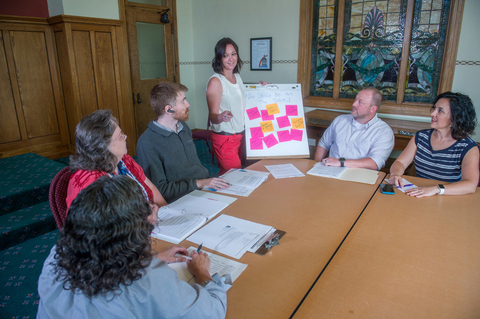Key concept
As groups seek to solve problems together, productive discussions are fundamental. Using working agreements is an early step to create meetings with clear expectations for involvement. When combined with skilled facilitation, good meeting design and thoughtful involvement by participants, working agreements help make meetings more effective.
How can you have more productive discussions?
Tip: Create working agreements
In public meetings, forums, hearings and other group settings, a productive discussion is critical. Working agreements help a group start and maintain a productive discussion. Working agreements clarify expectations for behavior in the meeting.
About working agreements
Working agreements are a short list of expectations to guide how a group works together. They are sometimes called ground rules, guidelines, or expectations. While many public organizations use parliamentary procedure as a form of working agreements, such formal practices may not be sufficient or appropriate for guiding public discussion.
Effective working agreements help:
- Encourage respectful listening;
- Increase participation and the sharing of ideas and perspectives;
- Promote openness to points of view and increase learning;
- Prevent conflict and misunderstanding;
- Manage problems before and as they occur; and
- Build trust and a sense of safety among group participants.
Suggestions for working agreements
Here are suggestions for working agreements or ground rules that can be especially helpful for public meetings:
- This is a public discussion, not a debate. The purpose is not to win an argument, but to hear many points of view and explore many options and solutions.
- Everyone is encouraged to participate. You may be asked to share what you think, or we may ask for comments from those who haven't spoken. It is always OK to "pass" when you are asked to share a comment.
- No one or two individuals should dominate a discussion. If you have already voiced your ideas, let others have an opportunity. When you speak, be brief and to the point.
- When you speak, state your name and where you live. In a public meeting, it is helpful to know who is speaking as well as where they live in the community.
- One person speaks at a time. Refrain from side conversations. Pay attention to the person speaking. If you think you will forget an idea that comes to mind, write it down.
- Listen to and respect other points of view.
- Do your best to understand the pros and cons of every option, not just those you prefer. Be as objective and fair-minded as you can be.
- Seek first to understand, not to be understood. Ask questions to seek clarification when you don't understand the meaning of someone's comments.
How to create working agreements
Groups can create working agreements in advance of the meeting, or with the group at the meeting. The group's size and purpose can determine how working agreements are set.
- In large public meetings, we recommend that meeting planners provide working agreements created in advance. This allows the group to focus on the meeting topic while having clear expectations for discussion.
- In smaller groups, creating expectations together as part of the meeting is a helpful first step to working and making decisions together, particularly in a group that will work together over time.
Once working agreements are clarified, leaders should confirm with the group that these practices will guide the discussion. The group's agreement allows the leader or a group member to directly address an issue when a guideline is not followed.
Having nine or fewer working agreements helps the group more easily remember and support them. Post agreements on a handout, table tent or flip chart so that they are readily available. If the group meets multiple times, repost agreements at each meeting to orient new participants and remind others.
Boyce, K. (2002). Ground rules for public participation. Fact sheet. St. Paul, MN: University of Minnesota Extension
Justice, T., and Jamieson, D. (1998). The complete guide to facilitation. Amherst, MA: HRD Press.
Scheffert, D., Anderson, M., Anderson, S., et al. (2001). Facilitation resources, volume 4: Managing group interaction. St. Paul, MN: University of Minnesota Extension.
Reviewed in 2024


